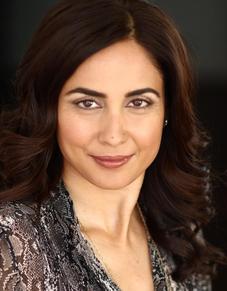 This profile features Anu K. Sandhu, another lawyer introduced to me through my Twitter followers (I think I am seeing a pattern here...) Anu is a family law and professional regulatory lawyer, called to the bar in both Ontario and British Columbia. What stood out for me in reading Anu's answers was her observation of the importance of integrity and intuition in a successful legal career. Neither should be ignored. Read on for some more great insights and advice: 1. Tell me a little about your practice or business: My practice is a mixed litigation and solicitor's practice. I have a background in many areas of law and have worked at private firms (large and small), a regulator as in-house counsel, at a human rights centre, and now in my own practice. I practice administrative and family law. I have found that running my own business offers me the flexibility I love. I'm also volunteering in various ways at the Howe Sound Women's Centre in Squamish, when I am able to, on one of the committees at Yaletown House (elderly care facility), and on a research ethics board for Fraser Health. I am able to combine community involvement with my interest in such things as health law. I am interested in pursuing work in an adjudicative capacity at some point as well. 2. Why did you go to law school? I was very idealistic when I was younger - I was pursuing both academics and law school but while in school, I volunteered and loved everything about advocacy. My ideal was to find a small firm where I could grow and work on the types of cases that interested me. But I was also curious about public advocacy litigation in a larger sense and have been fortunate to have worked at human rights centres and have volunteered in that capacity too. Philosophy was also a huge draw for me and it turns out that it has been helpful in thinking through and strategizing on cases. 3. How did you get to where you are today? Design? Chance? Both? Chance. If you asked me when I was younger, I would never have thought about law school. I did not go to an academic school and did not decide early on what I wanted to do. I, in fact, changed my mind many times which I now think is healthy. I sent out some applications for law school after writing my LSAT and then travelled for six months (the best thing!) after graduating with my first degree. When I look back, however, it was a choice that makes sense. From a very young age I was interested in words, poetry (another interest of mine). 4. What is your most significant achievement? What are you proud of? I am most proud of the small moments during points in my career where I had to make a significant decision either affecting my life, a client's life, or the direction on a file that felt true to me. It creates a sense of integrity overall which forms a foundation. We don't always pay attention to it but the decision to take a risk and work at a human rights clinic, to work in New York for a period, to stand up for yourself, even in how you draft a letter on a file creates ripples that continue to affect your life. You may meet someone who may change your outlook or affect the direction of a case in ways that you cannot understand in the moment until later. 5. What are some key challenges and opportunities for women in law? The challenges for women in law are real. I think we have seen the level of awareness that has been created from the "Me too" movement in the entertainment industry but frankly, this movement is taking place and needs to take place in other realms. For years, women have quietly been complaining amongst themselves about the "culture" in law which let's face it, is not always "progressive". It is the reason that it has taken so long for the truth and reconciliation momentum to pick up also. But I also think there are opportunities that are exciting and ones that we haven't even thought of yet. For example, women are increasingly setting up law firms but to the extent that they copy older and traditional models, there is a missed opportunity. 6. What advice would you give a woman starting her legal career? I love this question. When I was growing up it used to be that we had to model ourselves after men to be more "credible". All the films about women working in the 1980s for example show the struggle. In my year of law school, the student body was 50% women so things have changed. I think there is a period of time where a young lawyer has to learn the ropes so to speak and I am skeptical of a lawyer hanging up her shingle too soon without understanding how to run a business, work with clients, perform the work, etc. But I also think that there are many opportunities to learn, to do the kind of work you are interested in, to find mentors, and most importantly, to work in a way that makes sense to you. A woman that I looked up to simply was running a modest law practice. I suggest focusing less on where the crowd is going and turning inward to understand why you pursued law and how you want to work. There is so much room to do various and interesting pieces of work that reflects you. Supporting each other on social media or through notes or even by meeting for coffee/drinks and actively putting yourself out there is something I would encourage (even if you have children!). I also think that young women need to be careful not to undersell themselves and to be clear about things that they do not want to do or behaviour you will not tolerate (follow your intuition!). It isn't always easy but it will leave you with a sense of integrity. ---------------------------------------------------------------------------------------------------- Thank you Anu for taking the time to answer these questions! ICYMI: Previous posts profiled Claire Hatcher, Esi Codjoe, Kate Dewhirst, Jennifer Taylor, Rebecca Durcan, Atrisha Lewis, Vandana Sood, Kathryn Manning, Kim Hawkins, Kyla Lee, and Eva Chan. Sign up to have these profiles sent directly to your email address and stay tuned for the next post soon! The "Women Leading in Law" series focuses on good news stories and highlights amazing women succeeding in the legal profession. Each post includes the profiled lawyer's answers to six questions. Prepare to be inspired!
1 Comment
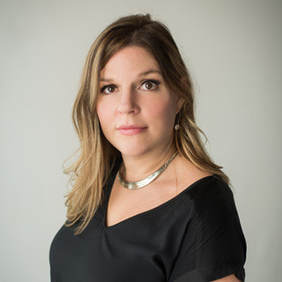 I've gone back to the criminal defence bar for the next amazing woman lawyer to be profiled in the Women Leading in Law series: Claire Hatcher. Claire was recommended to me by Lisa Jean Helps (who was very helpful in introducing me to some great lawyers from the West Coast). Through our email exchanges, and in her thoughtful answers below, Claire stands out as an authentic and accomplished lawyer in her field (and someone I would want to hang out with if I had the chance!) Read on for some great advice for women seeking out a career in criminal law or interested in starting their own practice: 1) Tell me a little about your practice or business: I practice with three other wonderful colleagues at Pender Litigation – a criminal law practice in downtown Vancouver which we started together in July, 2017. I practice criminal defence as well as some administrative law (workplace misconduct investigations; professional discipline). I occasionally take on Crown work as well. I also occasionally act for complainants in domestic violence and sexual assault cases, providing them with independent legal advice, or acting for them on defence applications under s. 276 or s. 278 of the Criminal Code. 2) Why did you go to law school? When I finished my undergraduate degree at the University of Guelph (Sociology; Family and Child Studies), I had a strong interest in family dynamics and therapy. After some volunteer work in the social work field, I found myself questioning how much change I could really effect without a law degree. It was only then I started to think about law school. I started the application process a year after obtaining my B.A. I attended law school at the University of Victoria 2000-2003. As is often the case, my interest shifted during law school towards criminal and constitutional law from my starting point of family law. And here I am now practising criminal law, so it all worked out perfectly. 3) How did you get to where you are today? Design? Chance? Both? Both, I would say. My design evolved from chance. I obtained a wonderful articled position with a well-reputed criminal defence firm in Vancouver, Bolton & Muldoon, and then was asked to stay on. I did stay on for 6 or so years as an associate, got a wealth of experience on all sorts of files, then started my own practice in 2011 called Bolton Hatcher Dance. Last summer, I started a new practice with three fantastic lawyers called Pender Litigation. We work hard, but we make sure it`s still fun to be there. 4) What is your most significant achievement? What are you proud of? Early in my career, I worked really hard for many years, developed a practice with a variety of private and institutional clients to balance things out, and then took the plunge into being a sole practitioner at just the right time and was able to build a thriving and interesting practice. Recently, at the risk of sounding cliché, I would say my biggest accomplishment is balancing family life and motherhood (and step-motherhood) with my still full-time practice, with a [way too] long commute. The clichés one hears are true – it’s all very challenging. 5) What are some key challenges and opportunities for women in law? I think this probably depends on the particular practice area, but in criminal law I would say it is the extra task - in addition to running your business and doing quality work – of negotiating long-entrenched stereotypes of a male-dominated defence practice. I can’t count how many times early in my career I was asked while sitting in a courtroom “are you Crown on x-file?"or “can you call this file for me real quick?” or “what’s your position on bail on x-file”. This may not sound like a big deal, and we can laugh it off in the moment to diffuse the awkwardness, but it does cumulatively get annoying and weigh on you as systemic sexism does. In the criminal defence world, I do think client development can be more difficult for women because there is still a belief – although usually unstated - that women aren’t tough enough to handle the “serious” files. I do believe there is a heightened need to “prove your mettle” and perhaps go out of one’s way to engage in vocabulary and tone that might serve to reassure clients you have the inherent ‘make-up’ to conduct their defence. [Perhaps male defence lawyers say that they have to engage in this too, but…] The spectre of potential parenthood – or if you’re already a parent – looms large as an elephant in the room right from initial hiring interviews to client interviews and retention. I know and feel things have evolved and improved, but they’re not resolved yet. This is still an issue that women contend with. We still hear stories of blatant “future plans re: procreation” questions from prospective employers (or clients, which brings it’s own fun magic to the table). And I must point out that it’s not an issue that only faces women who do want children or who have them. I empathize with the frustration of my female colleagues who do not want to have children or who cannot for a variety of reasons. Imagine feeling compelled to share this deeply personal information with employers and clients in service of “getting out ahead” of the topic or “putting it to rest” as some sort of comfort or reassurance to others (audible sigh). 6) What advice would you give a woman starting her legal career? This is tough to answer. It depends on the individual and the experience, personality and values they bring to their practice. Be flexible as to the path you take, but know that it is really a rewarding career (even if it sometimes feels like the worst decision you ever made). Give yourself perhaps a 5-year period where you know you’re going to have to work almost every day, at least to some extent, and perhaps for people who really aren’t that kind or considerate of your time or wellness. Go the extra mile with your research and written work product – and as a junior, make yourself indispensable both inside and outside of court. Rely on your friends and family to support you and help you weather the storms– listen to them when they tell you to take a break. Practically speaking, when you’re first starting – even as an associate, get set up with a great banker, a great financial planner, a great bookkeeper and a great accountant. If the latter two know each other, all the better! Having this in place early on will allow you to set yourself up for way better work-life balance in the future. -------------------------------------------------------------------------------------------------- Thanks Claire for sharing your story with us! ICYMI: Previous posts profiled Esi Codjoe, Kate Dewhirst, Jennifer Taylor, Rebecca Durcan, Atrisha Lewis, Vandana Sood, Kathryn Manning, Kim Hawkins, Kyla Lee, and Eva Chan. Sign up to have these profiles sent directly to your email address and stay tuned for the next post soon! The "Women Leading in Law" series focuses on good news stories and highlights amazing women succeeding in the legal profession. Each post includes the profiled lawyer's answers to six questions. Prepare to be inspired! 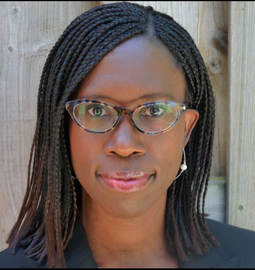 The next lawyer to be featured in the Women Leading in Law series is Esi Codjoe. I met Esi at a networking event a few years ago. I thought Esi would be a great lawyer to profile in this series as she currently has the interesting role of Vice Chair at the Human Rights Tribunal of Ontario and has been an adjudicator on the Landlord and Tenant Board. Read on to learn more about Esi's success in law (I especially like her answer to question number 3!) 1. Tell me a little about your practice or business: I am a labour and employment lawyer, and current Vice Chair at the Human Rights Tribunal. I have spent my career litigating, and now adjudicating, employment and human rights disputes. 2. Why did you go to law school? I chose to go to law school as I was really interested in access to justice, the rule of law and the advancement of rights. In addition, I was interested in a career that would enable me to engage in critical and analytical thinking. Lastly, I wanted to work in a field where I would be able to help people. 3. How did you get to where you are today? Design? Chance? Both? I got where I am today by design and because people have helped me along the way. Those of us who are honest recognize that it is important to work hard to achieve your goals, but no one achieves anything alone, we all get help, whether we realise it or not. 4. What is your most significant achievement? What are you proud of? I am proud of having attained my master of laws as well as my current role as a Vice Chair. In addition, I’m proud of the fact that I was elected to the OBA board of directors in 2016. However, my greatest accomplishment is that I am becoming the best version of myself, both personally and professionally. 5. What are some key challenges, and more importantly, opportunities for women in law? One of the key challenges is that we often have to fight to have our voices heard. Nonetheless, there is such diversity among female lawyers, and that affords us tremendous opportunity to articulate our unique visions and perspectives. 6. What advice would you give a woman starting her legal career? Understand yourself, it enables you to make hard choices that can inevitably lead to your success. When we know ourselves we can be braver, and pursue our goals with a gusto. I would also note that it is important to be tenacious. It helps you to push forward when there are obstacles placed in your path. --------------------------------------------------------- Thanks Esi for agreeing to participate. I completely agree that tenacity plays an important role in becoming a successful lawyer. I am always flattered when someone calls me tenacious! ICYMI: Previous posts profiled Kate Dewhirst, Jennifer Taylor, Rebecca Durcan, Atrisha Lewis, Vandana Sood, Kathryn Manning, Kim Hawkins, Kyla Lee, and Eva Chan. Sign up to have these profiles sent directly to your email address and stay tuned for the next post soon! The "Women Leading in Law" series focuses on good news stories and highlights amazing women succeeding in the legal profession. Each post includes the profiled lawyer's answers to six questions. Prepare to be inspired! 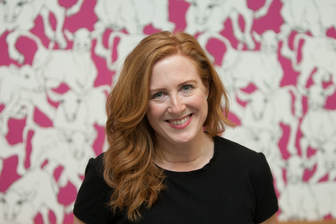 Welcome back to the Women Leading in Law series! This post profiles health lawyer, legal entrepreneur, and coach, Kate Dewhirst. Kate is a great example of a lawyer who thinks outside the box and has built a practice and career that she truly loves. Read on to learn why Kate feels like she is the luckiest person in the world and how new lawyers can feel this way too: 1. Tell me a little about your practice or business. My official work is as a health lawyer in Ontario. I advise health care organizations, such as hospitals and family health teams and mental health clinics, and help them understand the laws that apply to them. Unofficially, I’m an untangler of messes - whether those messes are privacy breaches or complicated human relationships or complaints from patients and families or people behaving badly. I get asked to help people untangle their complicated situations and find a way forward. I feel like the luckiest person in the world. I really love what I do. I love my clients. I have a great team. I am in a constant creative learning loop – changing up what I do and figuring out new ways to make a positive impact for my clients. 2. Why did you go to law school? When I was 3 years old, I was given a Harvard Law School sweatshirt. Since that moment, I wanted to go to law school. My father was a police officer. So originally I thought I’d go to law school to become a Crown Attorney. My mum was a nurse and taught nursing – and I was exposed very early on to health care issues and challenges. When I was in undergrad and learned there was such a thing as “health law” – that was it. I knew I found the perfect combination for me. 3. How did you get to where you are today? Design? Chance? Both? I’m a very intentional person. So while life has inserted all kinds of wonderful and challenging twists and turns for me – for the most part, I am where I am because of design. I have been a dedicated goal setter my whole life. First, it was informally done on my own. I got serious about goal setting about five or six years ago when I started with Strategic Coach, which is a coaching program for entrepreneurs. That catapulted my career. Through them, I learned how to harness my strengths and leverage my talent by connecting with other people using their talents. 4. What is your most significant achievement? What are you proud of? I’m proud that I have my own business that reflects who I am. I think that’s super cool. I’m a kid from a small town. Every now and then I look back and measure how far I have come from being little Katie Dewhirst from Bradford, Ontario. Now, I am a successful legal entrepreneur and coach. I advise and teach the smartest, most compassionate people there are – health care providers and leaders. They find tremendous value in what I have to share with them. That blows my mind. I fly all over Ontario (and sometimes Canada) for my work. I get to train with the best business coaches and advisors in the world to continually up my game. All while being authentically me. I have fun with my team and we are constantly laughing in the office. And most importantly, I feel very connected to my family, friends, team and clients. I invest a great deal of time, energy and creativity in my relationships. Because of that, I am a deeply connected person. There are a lot of people with whom I can joyfully share in life’s successes and vulnerably share in life’s tragedies. I am surrounded by love. I am proudest of that. 5. What are some key challenges and opportunities for women in law? Law is still gendered. Even today in 2018. I started law school in 1995. I believe mine was the first class with a higher number of women than men. I acknowledge that I have experienced advantages that women who came before me did not have. And yet, a lot of my female contemporaries no longer practice in traditional law firms or hold legal positions. When I go to legal conferences, especially those geared towards solo or small legal practices – it still feels like the majority of legal business owners are men. I came to motherhood in my 40s. So, the balancing act of family and work came when I had a lot more control over my circumstances than younger parents might experience. Still, it’s hard. I find the pulls of time and attention challenging. I’d love to add an extra day to each week so I could feel like I’ve done a great job at all my competing tasks. And yet – I feel really blessed. Blessed that I have a life of love and family and work that fulfills my creative soul. 6. What advice would you give a woman starting her legal career? Find a mentor. Get a coach. Expand your definition of success. So many lawyers focus on time and money as the only indicators of their success. But I would wholeheartedly encourage young lawyers to also consider measuring their success by the impact they want to have in the world, their growth, the alignment of their personal and professional values and whether they are having fun. ---------- Thank you so much Kate for agreeing to be profiled in this series. It is encouraging to see lawyers who love, and are passionate about, what they do! ICYMI: Previous posts profiled Jennifer Taylor, Rebecca Durcan, Atrisha Lewis, Vandana Sood, Kathryn Manning, Kim Hawkins, Kyla Lee, and Eva Chan. Sign up to have these profiles sent directly to your email address and stay tuned for the next post soon! The "Women Leading in Law" series focuses on good news stories and highlights amazing women succeeding in the legal profession. Each post includes the profiled lawyer's answers to six questions. Prepare to be inspired! 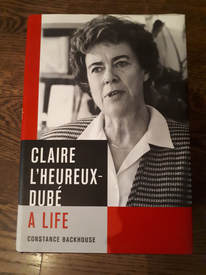 “How can such a feminist, not be a feminist?” This thought popped into my head more than once as I voraciously consumed Constance Backhouse’s biography of former Supreme Court of Canada Justice Claire L’Heureux-Dubé called “Claire L’Heureux-Dubé: A Life”. The book truly covers all of L’Heureux-Dubé's life, from her pre-birth family history to her post-retirement activities, including her complicated relationship with her father, the important role her mother played in her life, how she became known as the “Great Dissenter”, and the personal tragedies that befell her. Backhouse bookends the 545 paged biography (excluding 200 pages of endnotes) with L’Heureux-Dubé's reasons in the R. v. Ewanchuk decision and the public fallout and harsh personal criticism she endured as a result. What stood out for me though, throughout reading this book, was a repeated refrain that L’Heureux-Dubé did not identify as a feminist. Professor Backhouse notes that L’Heureux-Dubé “was not someone who would ever claim membership in ‘women’s lib’” (p.228) and that “[t]he irony was that Claire L’Heureux-Dube rose to become a flag bearer for a movement to which she never belonged.”(p.229) One excerpt is particularly revealing. When a group of women “invaded” a Quebec tavern that barred women (but made an exception for L’Heureux-Dubé when she lunched there with her colleagues when she was a practicing lawyer) and started “crying out loud that they had a right to sit in a tavern just as men did”, L’Heureux-Dubé observed: They called themselves feminists in a place where men were drinking their pay while their wives were crying in our offices unable to pay their debts. To me, they were a bunch of crazy women, while we were fighting for justice where justice counted, in courts and before the legislature. The word feminist for me from thereon was associated with those crazy women and I never wanted to be part of it. (p.206) This passage I think explains a lot. And I understand. While I have always identified with feminist ideals and causes, I have not always called myself a “feminist”. In my third year of undergrad, I enrolled in a feminist literary criticism course. One day when I was leaving the seminar room a fellow student started a conversation with me, saying: “I’m not sure if I like the word ‘feminist’ to be honest, I’m not sure if I would call myself that, perhaps there is a better word?” At the beginning of the next class another student stood up to explain to the whole class how she overheard “some students” (looking at me and my walking companion) say that they did not identify as feminists. She “could not believe that women in the year 2000 (!) thought this way” and she suggested that we had no place in that classroom or words to that effect. I felt embarrassed, I felt ashamed, I felt enraged, but most importantly I thought – if THIS is what it means to be a feminist and what feminism stood for, I want no part of it. I started calling myself an “equalist” for the next few years before I came to my senses and embraced being a feminist again. The point of this story though is I never stopped acting like a feminist or advocating on behalf of women’s rights, I simply stopped labelling myself a feminist. The label didn’t fit. It just didn’t feel right to me. And while I am comfortable with and fully embrace this label now, I do not judge other women or men who do not call themselves feminists. Do they support gender equality? Do they advocate for women’s rights? That’s all I care about. It was the critics (and supporters) that labelled L’Heureux-Dubé a feminist and because of this she built a reputation as one. However, what is clear from this book is that it is not a label that fits or feels right to her. This does not diminish her advances in the fight for women’s equality or her steps in paving the way for other women to gain access to the bench. Another observation: In commenting on her appointment to the bench and promotion up the judicial ladder, L’Heureux-Dubé and other female judges featured in the book often commented that they were “just in the right place at the right time”. I always bristle a little bit when distinguished, competent, and intelligent women say this. And I hear it a lot. I attended a session by the OBA’s Women Lawyers Forum called “Pathways to Power: Getting More Women on the Bench”. Every woman judge on the panel stated this as well, that she “was just in the right place at the right time”. While I know this is likely an act of humility and no harm is meant, I believe such a comment can do a disservice to women seeking out judicial positions and may discourage women from applying to the bench at all. This makes it sound like a judicial appointment is all luck or serendipity. It could discourage women from readying themselves appropriately (taking the steps to build a career and legal experience that would attract a judicial appointment) and downplays the significant work that these women accomplished before being appointed. Yes, luck or serendipity may play a role, but I do not believe it is simply a case of “being in the right place, at the right time”. While Backhouse also concludes that L’Heureux-Dubé was in “the right place at the right time”, she suggests that the feminist movement deserves some credit too. L’Heureux-Dubé: “was unattached to the burgeoning new feminist organizations. But when the politicians went looking, she was in the right place at the right time. Simply by being the most senior woman in private practice in Quebec, she was the obvious woman for the job. . . Her opportunity emerged because the women’s movement insisted on change.”(pp.228-229) Overall, this was a book I could not put down once I started and finished it in under a week. I would be working at my office and I would count down the hours until I could go home and pick it up again. Perhaps it is just the legal geek in me who loves anything to do with law, but I believe it had more to do with the excellent story telling on the part of Backhouse. She drew you in to the life of L’Heureux-Dubé , but left her own impression on you, the reader, as well. Backhouse’s views were provided, but in a subtle way. She was always there guiding the reader and reminding her of a different interpretation as to the events that occurred, an outside observer’s perspective on very personal inside accounts. Aside from the fascinating feminist analysis Backhouse brings to L’Heureux-Dubé’s life and career, this book offers so much more to lawyers, law students, or anyone interested in Canadian legal history. |
Erin C. Cowling is a former freelance lawyer, entrepreneur, business and career consultant, speaker, writer and CEO and Founder of Flex Legal Network Inc., a network of freelance lawyers.
Categories
All
Archives
June 2024
|
|
(C) 2014-2024 Cowling Legal. All rights reserved.
|
Please note I am not currently practicing law.
Information on this website does not constitute legal advice and is for informational purposes only. Accessing or using this website does not create a solicitor-client relationship. See website Terms of Use/Privacy Policy. |
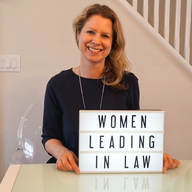
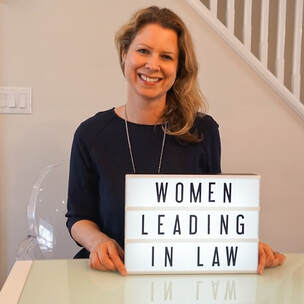
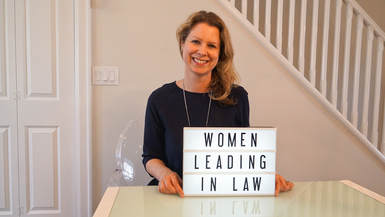
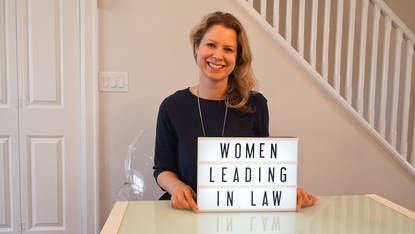
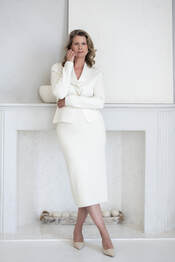





 RSS Feed
RSS Feed
